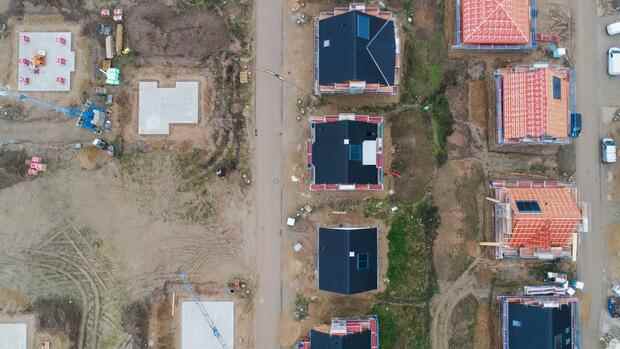Experts expect mortgage lending rates to rise in 2022.
(Photo: dpa)
Frankfurt They are considered to be a key factor in the rising prices on the German real estate market: the favorable financing conditions. If you want to buy a property with the help of the bank, you can get an APR of less than one percent for the loan. This not only attracts consumers, banks also have high hopes for the business with supposedly secure real estate loans.
According to a recent study by the auditing and consulting firm Pricewaterhouse-Coopers (PwC), new business by banks and savings banks climbed to 235 billion euros from January to October 2021, after 228 billion euros in the same period of the previous year. The business is thus on a record course for the year as a whole.
The portfolio of construction loans increased to 1.47 trillion euros in the first ten months, significantly exceeding the financing volume for the full year 2020 of 1.39 trillion euros. “Low interest rates, a high savings rate and rising inflation rates should continue to have a positive effect on the growth trend in construction finance,” says Tomas Rederer, partner at PwC Germany.
But the supposedly low-risk business has its downsides: It means that banks have to fight for good customers, and that depresses margins. On average, according to PwC, the net margin after refinancing costs fell to 1.05 percent pa in 2021 from 1.13 percent in the previous year.
Top jobs of the day
Find the best jobs now and
be notified by email.
It is a development that the Bundesbank is also closely monitoring. She had recently spoken out with a warning: On the one hand, the Bundesbank pointed out that the prices of residential real estate are now overvalued by ten to 30 percent, and the effects of price corrections could consequently be underestimated.
On the other hand, she warned banks not to take too great a risk in lending. The banks “have to adhere to high lending standards,” warned Bundesbank board member Joachim Würmeling.
Real estate banking association not alarmed
On the part of the banks, however, they are calm. The demand for real estate is high and that has made prices for houses and apartments more expensive, the Association of German Pfandbrief Banks (vdp) recently announced. From the middle of 2014 to the middle of 2021, prices rose by an average of 6.6 percent per year and thus significantly more than the income of private households.
But that does not mean that the banks are taking a higher risk. Borrowers would currently bring more of their own funds with them to purchase real estate and would have a higher household income. The share of borrowed funds fell accordingly from 82 percent to 80 percent, the credit rate – the share of the expenses for servicing the loan in the disposable income of the buyer households – from 26 percent to 25 percent.
Compared to the last survey from 2019, the relative credit burden also fell slightly for all income groups. “This is proof of the cautious and risk-limiting lending practice of the Pfandbrief banks”, emphasized vdp Managing Director Jens Tolckmitt. “With the high level of home ownership prices, banks and customers continue to act in a security-oriented manner.”
The average fixed interest rate is fourteen years, but the proportion of loans with fixed interest rates up to and including ten years has risen from 27 percent in 2019 to currently 35 percent. Short and medium-term fixed interest periods, on the other hand, only played a marginal role with a share of just under one percent.
Rising interest rates expected
For real estate buyers, however, loans are likely to become more expensive soon. According to the financial consultancy FMH, the interest for ten-year mortgage lending is currently just under one percent per year on average. “I expect the interest rates for mortgage lending to rise by 0.25 to 0.5 percentage points in the coming year,” says Max Herbst, founder of the Frankfurt-based FMH-Finanzberatung.
The Munich real estate financier Interhyp also expects interest rates to rise. The persistently high inflation is putting the central banks more and more under pressure. “At the latest when the risks of economic and social setbacks due to the corona pandemic decrease in the course of 2022, rising interest rates will become more likely,” says Jörg Utecht, CEO of the home finance company.
With an interest rate increase of 0.2 percentage points from today’s usual one percent interest rate to 1.2 percent, the interest costs for an average loan of around 350,000 euros within a ten-year fixed interest rate and with an initial repayment of three percent would increase by around 5,700 euros .
More: Rising prices, building material shortages and overvaluations – the problems for building owners are worsening.
